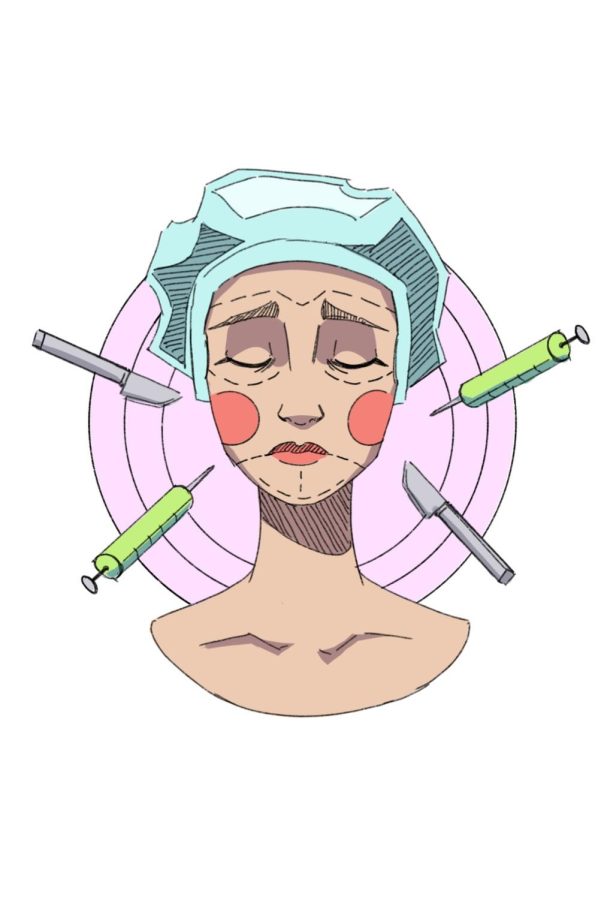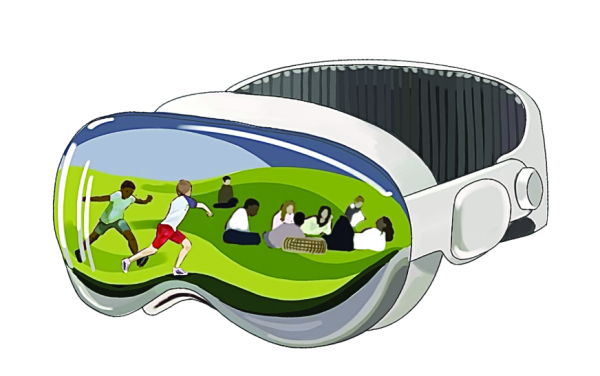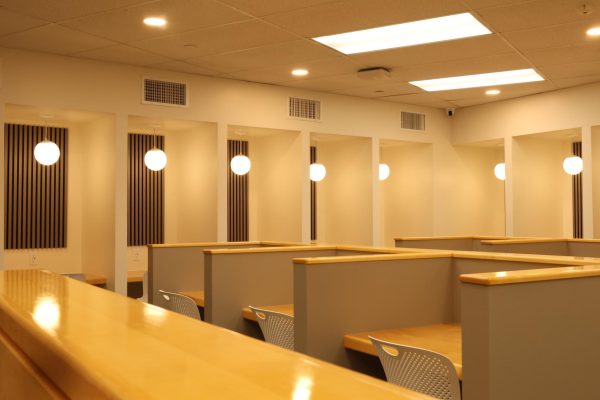The harms of teenage plastic surgery
Illustration by Chiara Umekubo
A stressed teenage girl is preparing to receive facial plastic surgery.
November 4, 2022
Being both Asian and white meant that visiting family in China was always accompanied by unwanted stares and frequent remarks about my appearance. My fair skin and double eyelids led to people telling me how blessed I was for having such features. Even though these remarks were meant as compliments, they were still very uncomfortable to receive. Whether I was browsing in the famous Shanghai street shops, visiting friends or checking into a hotel, reminders of the relentless beauty standards were everywhere —especially in the products and cosmetic surgery ads that promised immediate and cheap changes to more Western features.
The exploding popularity of cosmetic surgery has left teenagers unaware of the serious emotional and physical complications that can arise. Cosmetic surgery is an ever-growing phenomenon, with nearly 400,000 teens in the U.S. between the ages of 13 to 19 undergoing a procedure in 2020, according to the American Society of Plastic and Reconstructive Surgeons. Teenagers seek out surgery as a response to the fear of not fitting in, and the growing popularity of teenage cosmetic operations only adds to this feeling of necessity.
Even though the U.S. has the highest number of cosmetic surgery cases, South Korea is known for a myriad of professional surgeons. A BBC News poll said 50% percent of South Korean women in their twenties have received a procedure, while other estimates by Gallup Korea said that 33% of all women have gone under the knife. The Washington Post noted that ads in South Korea are targeting younger women, specifically teenagers.
The industry is also booming in other East Asian countries, with China growing to an estimated $201 billion medical beauty industry by 2030, according to the Global Times.
Teenagers are the main victim of this growth: Plastic surgery is increasingly normalized by the world around them, with even the former President of South Korea going under the knife for double eyelid surgery. Many famous East Asian idols and celebrities have also gotten procedures to deal with the pressure to maintain their youthful beauty.
Beauty standards vary in East Asian countries but typically include pale skin, small nose, double eyelids, a thin frame and big eyes. The goal is to blend Asian and Western features in both East Asian and the U.S. media. The desire for a simultaneously European and Asian appearance has led to massive insecurities among teenagers, leading to many seeking surgery. According to the New Yorker, many Korean teenagers mention the pressure they feel when all of their friends get surgery. There is a massive fear of missing out and not being good enough, which is the result of comparison culture.
Growing up, I have always been compared to peers when it came to my appearance, grades and personality. While this is often because parents want to feel a sense of pride in their children, the result is the fear of lagging behind and no longer being good enough to even be compared. Cosmetic surgery is viewed as an investment for a teenager’s future, as it determines their ability to get a job, be liked and find a partner.
A study by the Adolescent Plastic Surgical Research Group shows how even though many teenagers and adolescents claim to feel more confident after receiving surgery, there is no direct correlation between plastic surgery and increased confidence. Rather, people are typically more confident as they age, regardless of whether or not they receive plastic surgery. Teenage plastic surgery is the result of a culture that pressures women and preys on their insecurities for economic gain, an incredibly dangerous sentiment in our society.
Despite there being many professional doctors in South Korea, many teenagers and those who travel for cosmetic surgery have incorrectly presumed cosmetic surgery procedures to be safe because of how many celebrities have shared their success stories.
According to a CNN report, a lack of laws in Korea results in patients becoming victims of ghost doctors when someone other than the hired surgeon performs the surgery. Complications can also occur for procedures as simple as double eyelid surgery including loss of vision, scarring and difficulty closing eyes. The New York Times notes that for surgical implants, a third of women are likely to face a serious complication within the first three years, leading to repeated surgeries.
The devastating emotional and physical impacts of teenage plastic surgery make it bad enough, but according to the National Institute of Mental Health, our brains are not fully developed until our mid to late twenties. Teenagers are not capable of making life-altering decisions without proper reasoning, especially when it can compromise their emotional and physical well-being.
Additionally, teenage cosmetic surgery pushes patriarchal views. It has been placed under the guise of female empowerment in the U.S., as sexualization has been increasingly conflated with feminism. The Department of Psychology at the University of Westminster said couples and individuals considering cosmetic surgery foster judgemental and even hostile attitudes towards women. While the motives behind getting cosmetic surgery cannot be explained solely by sexism, it is perpetuated and reinforced by a patriarchal system that places pressure on young women to look a certain way for the male gaze.
The American Society of Plastic Surgeons notes that out of all plastic surgery cases, 92% are women. Young girls have become victims of plastic surgery at the hands of comparison culture and social media. Plastic surgery is on the rise, and societal beauty standards are increasingly tightening women into an impossible mold, where their beauty defines their confidence and success.






































